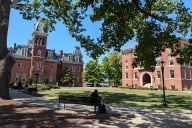You have /5 articles left.
Sign up for a free account or log in.
MIAMI BEACH, Fla. -- Presidents whose institutions are members of the Council of Independent Colleges have been working on a project to help map the future of their institutions, which are generally small and midsize private colleges. At its annual gathering of presidents here, the CIC held an open forum on the project and released a draft list of characteristics that a panel of presidents identified as "essential" for their institutions, and another list they identified as "negotiable."
The essential list wasn't controversial, although some presidents argued for it to be shortened. Essential qualities for private colleges should be that "they add value to their students and graduates," that they "make decisions on the basis of shared governance without interference from state or federal governments," that they "foster high levels of student engagement," that they have "a student-centered culture," that they are "oriented toward their communities" and that they are "committed to cost containment and affordability."
There wasn't debate over the "negotiable" list, either. Among the items declared negotiable were tenure, "the composition of the faculty, including the proportion of the full-time faculty members," and "the definition and centrality of 'liberal arts.'" While those items' inclusion may anger many professors, at least one other item on the list may alarm some alumni: "the extent and depth of commitment to intercollegiate athletics."
The list is just a draft, and many colleges have been gradually moving away from tenure-track faculty slots for years, and task force members here whose colleges have tenure stressed that they have no plans to do away with it. But they also acknowledged in interviews after the session that they realized the placement of tenure on the nonessential list would be unpopular with some professors. Still, they defended the decision.
Chris Kimball, chair of CIC's board, leader of the task force and president of California Lutheran University, said CIC never tells its member colleges what to do, and that many colleges would continue to keep tenure systems. He said at his university, tenure "is essential."
But Kimball and others rejected the idea -- long held by the American Association of University Professors and others -- that faculty rights are built around tenure.
Elizabeth A. Fleming, president of Converse College, is another panel member from a college that has and plans to continue tenure. She also acknowledged that there are many colleges that do not treat their non-tenure-track faculty members well.
But she said it was important to state that colleges can have "deeply committed faculty" without a tenure track. She said academic leaders need to move beyond the idea that "the only options" are tenure and course-by-course adjunct contracts.
Edwin H. Welch, a task force member who is president of the University of Charleston, which does not have tenure, said that colleges without tenure can and do hire professors in ways that respect the faculty role.
"If we’re serious about student engagement we need faculty members who are experienced in providing that kind of engagement," he said. "You don't get that by putting out an ad and signing someone to teach just one course."
The CIC project on the future of private colleges extends well beyond the list of essential and negotiable qualities. The task force has been commissioning research on new business and curricular models for higher education. CIC may organize regional meetings to talk about this research and related efforts, and invite colleges to send teams -- including faculty leaders -- to those meetings.
Several people in the audience expressed concern about whether faculty members might block the kinds of changes that many colleges leaders feel their institutions need to consider.
One president took issue with those comments.
“I don’t think we've looked carefully enough at how the role and power of our faculty can be more of a part of solving this problem than to be characterized as recalcitrant," he said. On his campus, he said, the "brain power of faculty vastly exceeds that of the administrations," and that when administrators do things that alienate faculty members, "we spend all of our time putting out those fires" rather than working together to solve problems. Most faculty "care deeply" about their institutions, he said. (Under CIC rules for reporters at the meeting, attendees in sessions may not be quoted by name without their permission, so some of the quotes in this article are anonymous.)
Rudy H. Fichtenbaum, national president of the American Association of University Professors and professor of economics at Wright State University, was not at the meeting here. But he said in a phone interview that he was dismayed by the idea that college presidents did not see tenure as essential. Tenure is the basis of academic freedom, he said. And faculty members at private colleges don't have the ability to unionize or the First Amendment protections available to professors at public colleges.
Fichtenbaum also said that the track record of colleges without tenure isn't one of preserving faculty rights. "They are hiring this way to save money," he said.








